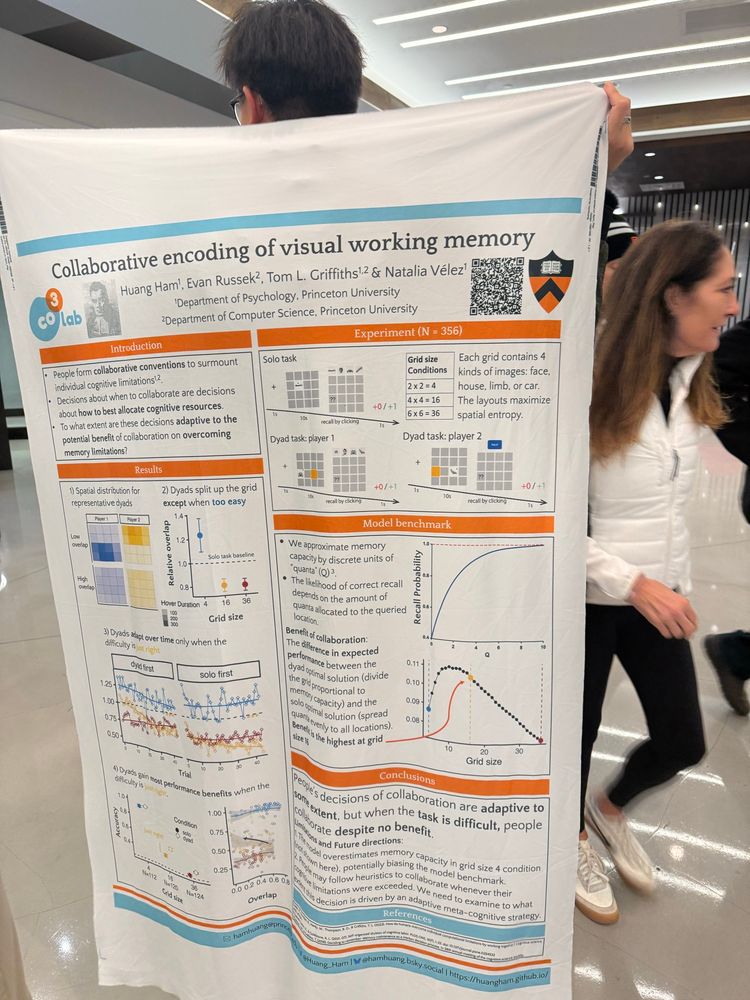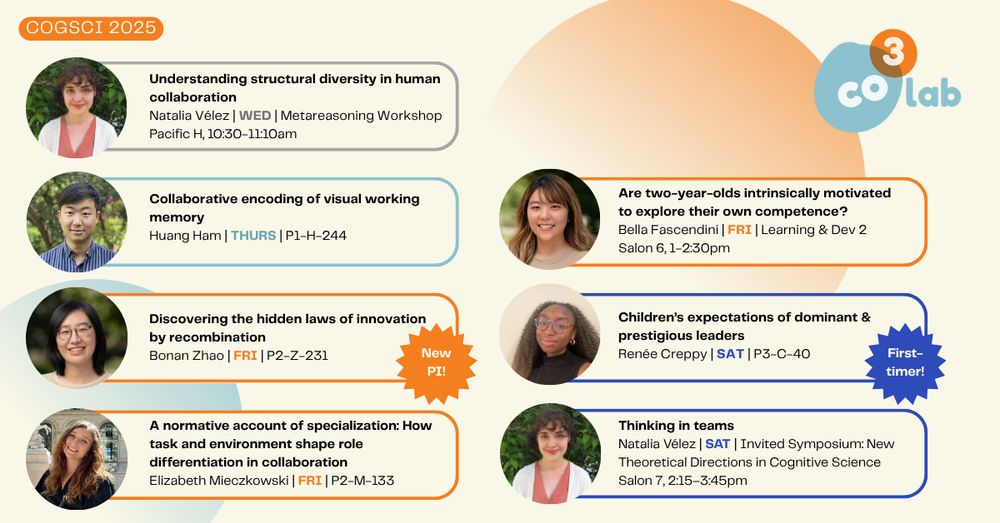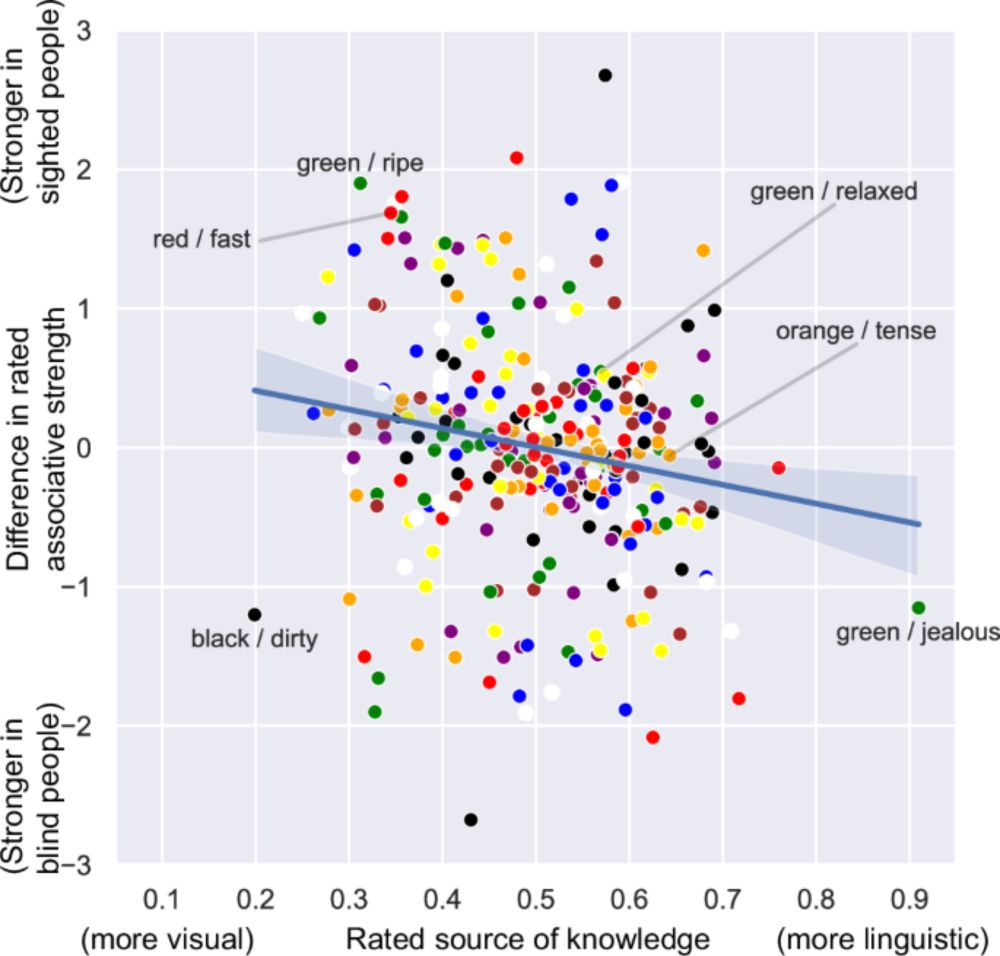OSF
@gershbrain.bsky.social and I have a new paper in PLOS Comp Bio!
We study how two cognitive constraints—action consideration set size & policy complexity—interact in context-dependent decision making, and how humans exploit their synergy to reduce behavioral suboptimality.
osf.io/preprints/ps...
19.08.2025 03:56 —
👍 25
🔁 11
💬 1
📌 0
Great mentor! Can’t go wrong!
17.08.2025 13:40 —
👍 1
🔁 0
💬 0
📌 0
Imagine this scenario: would you rather me giving $2 to you and $1000 to a politician or not giving you or the politician any money at all? Many people would choose the latter option, even though the first option gives them more monetary benefits.
16.08.2025 22:33 —
👍 1
🔁 0
💬 0
📌 0
People don’t always choose the option with more money because what people find rewarding is not simply the amount of money, but also social equity. When deciding which option is more rewarding, people consider both the amount of money and the inequity.
16.08.2025 22:33 —
👍 0
🔁 0
💬 0
📌 0
However, making decisions is different from learning from rewards. People always know which option feels more rewarding to them when making decisions, but learning from reward can happen very implicitly. People learn to choose the rewarding options without knowing it.
16.08.2025 22:33 —
👍 0
🔁 0
💬 0
📌 0
How can social inequity matter if people may not even realize that they learned from reward? We found that surprisingly, it matters! A lot! This suggests that social inequity profoundly impacts reward representation at all levels.
16.08.2025 22:33 —
👍 0
🔁 0
💬 0
📌 0
In 3 experiments (N=280), subjects tried to learn which of 3 keys gave more reward ($0, $1, or $2) in different contexts. The reward was split with another person. We manipulated the inequity level from 0% to 100%. The keypress only determined the total reward.
16.08.2025 22:33 —
👍 0
🔁 0
💬 0
📌 0
We found a huge inequity effect. When subjects received less than 50% of the reward, they learned more slowly and less effectively. Moreover, they were more sensitive to inequity levels under 50%. For example, 80% vs 90% made less difference to learning quality than 10% vs 20%.
16.08.2025 22:33 —
👍 0
🔁 0
💬 0
📌 0
We discovered that reinforcement learning is also socially contextual! We are currently working on an fMRI study to tackle follow-up questions about how the social brain ties to the learning brain, led by Mu-chen and in collaboration with Joe Kable. Stay tuned!
16.08.2025 22:32 —
👍 2
🔁 0
💬 0
📌 0
People don’t always choose the option with more money because what people find rewarding is not simply the amount of money, but also social equity. When deciding which option is more rewarding, people consider both the amount of money and the inequity.
16.08.2025 22:28 —
👍 0
🔁 0
💬 0
📌 0
Imagine this scenario: would you rather me giving $2 to you and $1000 to a politician or not giving you or the politician any money at all? Many people would choose the latter option, even though the first option gives them more monetary benefits.
16.08.2025 22:27 —
👍 0
🔁 0
💬 0
📌 0

Here is the full poster ;)
30.07.2025 18:13 —
👍 9
🔁 0
💬 1
📌 0

A lineup showing upcoming talks and posters for the CoLab at CogSci 2025.
Wednesday
Natalia Vélez: Understanding structural diversity in human collaboration
Metareasoning Workshop, Pacific H, 10:30-11:10am
Thursday
Huang Ham: Collaborative encoding of visual working memory
P1-H-244
Friday
Bonan Zhao (new PI!): Discovering hidden laws in innovation by recombination
P2-Z-231
Elizabeth Mieczkowski: A normative account of specialization: How task and environment shape role differentiation in collaboration
P2-M-133
Bella Fascendini: Are two-year-olds intrinsically motivated to explore their own competence?
Learning & Development 2, Salon 6, 1-2:30pm
Saturday
Renée Creppy (first-timer!): Children’s expectations of dominant and prestigious leaders
P3-C-40
Natalia Vélez: Thinking in teams
Invited Symposium: New Theoretical Directions in Cognitive Science
Salon 7, 2:15-3:45pm
The CoLab is headed to #CogSci2025!! 🥳 Here's where to find us!
29.07.2025 17:15 —
👍 33
🔁 9
💬 0
📌 3
Excited to see the work during my undergrad times finally come out! Learned so much from working with Sam and Anne on this project.
12.07.2025 00:20 —
👍 12
🔁 2
💬 0
📌 1










